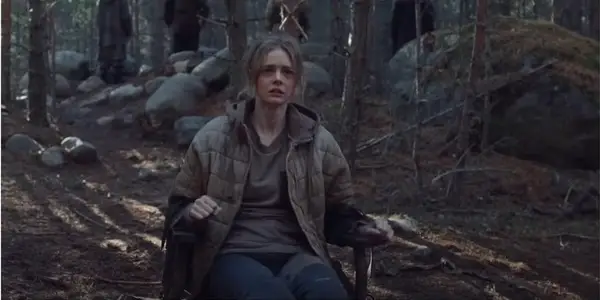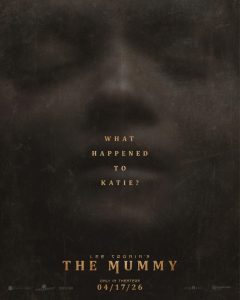
EL Katz’ new post-apocalyptic horror film, Azrael, is a slender, effectively bone-crunchy tale of survival unfortunately overladen with muddled religious symbolism and several “elevated” gimmicks du jour. The set-up should be simple: After the Rapture, the first of several haphazardly placed title cards tells us, religious cultists have taken a vow of silence in the woods to free themselves of sin. We begin with a romantic moment: A couple played by Samara Weaving (Ready or Not, The Babysitter, whose status as a scream queen should be netting her more leading roles than she’s received up to this point), and Nathan Stewart-Jarrett (Misfits, Femme).
source: Shudder
They exchange wordless caresses in the sun-dappled woods, sitting among the trees at one point in a frame that inadvertently recalls Twilight. Soon, though, a ragtag band violently attacks the happy couple. Upon waking, the man and the woman are separated, and the woman, seemingly a former cultist cast out for a past transgression, finds herself tied to a chair, sacrificial bait for an eldritch being whose charred-yet-sticky pelt evokes the bog bodies of Guy Maddin’s forthcoming Rumours. With these stakes established, the rest of the film, we can safely assume, will be a one woman show, equal parts revenge thriller (dispatching the cult for breaking up her small family) and zombie movie. As the blood starts to flow, however, some of this clarity gets lost, muddying what should be a taught narrative and making the film’s slim 85 minute runtime feel occasionally bloated.
Speak No Evil
There has been no shortage of “silent” horror movies since A Quiet Place inspired a rash of imitators across subgenres, from last year’s quirky alien mind-bender No One Will Save You to this year’s sleeper-hit prequel, A Quiet Place: Day One. This less-is-more approach to cinematic conversation in 2024 also appears in long stretches of Furiosa and In A Violent Nature, as well as the bigfoot arthouse comedy, Sasquatch Sunset, making Azrael feel less innovative through familiarity with this conceit. One of the greatest strengths of Katz‘ work here, though, is channeling his actors’ expressiveness to really showcase this premise. Weaving in particular, whose hyper-expressive, Disney-princess-sized eyes and sharp cheekbones cut a magnetic figure in any context, shines here, clearly having whole conversations with her co-stars, Katariina Unt and Vic Carmen Sonne, through eye contact and microexpressions alone. The monsters themselves, too, are visually striking and suitably bloodthirsty, setting a brisk pace as they run and tear and scream with abandon. Other highlights are the film’s synth-y, rhythmic, almost clubby score by Tóti Guðnason, and the set decoration, which fills out this particular world’s end in an intriguing, if slightly too conventionally “folk horror” way.
source: Shudder
Azrael’s play with the tenets of religious folk horror is where it really flags. While a panicked look or a tormented quirk of the mouth works wonders in a life or death situation, when it comes to conveying a complex religious allegory whose only other clues come from folksy church paintings, more explanation could have gone far. The presence of those aforementioned title cards attests to the difficulties of combining these two trendy horror premises–– here, they seem to prove, actions can’t fully speak louder than words. Samara Weaving’s character, some may only learn from the credits, is Azrael, the Angel of Death. This confirms the vague sense that her cult has rejected her based on a prophecy painted on the wall about their imminent destruction, but the minutia are hazy. When the last scene incorporates the very latest religious horror trend––this film’s small cast of characters includes a conspicuously pregnant cultist/nun a la The First Omen, Immaculate, and even Apartment 7A–– things only sort of click into place. In this case, the high concept isn’t as visceral as the viscera it proffers, and we’ve heard this one before.
Conclusion
On a less intellectual level, though, the overall result of the ending is undeniably cool and surprising (if admittedly in part due to its convolutedness), and a survival plot of this kind is hard to mess up when the star is talented and the monsters look good. Azrael has buckets of blood, some fun traps, and plenty of intrigue for those willing to overlook these gestures towards deeper meanings more fully (and frequently) fleshed out elsewhere.
Azreal was released in theaters on September 27th, 2024.
Does content like this matter to you?
Become a Member and support film journalism. Unlock access to all of Film Inquiry`s great articles. Join a community of like-minded readers who are passionate about cinema – get access to our private members Network, give back to independent filmmakers, and more.












